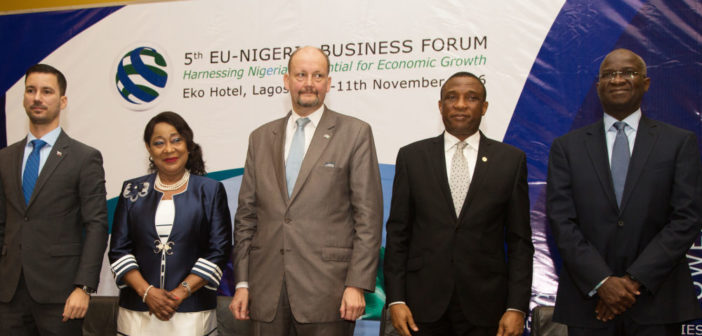The Federal Government has announced plans to spend an estimated $150million on rural electrification programme in the country using 44 tertiary institutions and the small hydro dams in the rural areas of the country as anchors for the programme.
According to a press statement issued by the special assistant on communication to the Minister of Power, Works and Housing, Babatunde Raji Fashola, Hakeem Bello, the plan was disclosed in Lagos by the minister who also pledged to uphold all contractual obligations entered into with investors.
Fashola disagreed with proposals in the public space calling for the cancellation of the privatization of the power sector stressing that investors that took the plunge into the venture must have the assurance that government would not flip flop and that contracts that fail have consequences.
Speaking at the Eko Hotel, Victoria Island, venue of the 2016 European Union- Nigeria Business Forum with the theme, “Financing opportunities in the Nigerian Power Sector”, Fashola said the amount would be deployed towards providing Independent Power Plants (IPPs) to supply electricity to the tertiary institutions with a view to extending same to the rural communities in their environs.
The minister, who explained that 37 out of the 44 tertiary institutions audited were universities while seven were teaching hospitals, said government would deploy 37 IPPs made up of nine gas plants and 28 solar plants with a combined generation capacity of 120 megawatts to power all the universities.
Disclosing that President Muhammadu Buhari has approved the rural electrification programme, he explained that the 37 IPPs would replace 1,105 generators that were hitherto serving the institutions and generating 210 MW of “inefficient and unclean energy,” adding that the amount would cover Capital Expenditure (Capex), operations and maintenance.
The Minister pointing out that by privatisation, government has expressed intention to let go of power generation and power distribution, while retaining transmission through the Transmission Company of Nigeria (TCN).
He said with the privatisation of the sector, government’s role was now restricted to policy making through the ministry in areas like the energy mix, safety of energy and governance, regulation through the Nigerian Electricity Regulatory Commission (NERC) to license, monitor and sanction the operators as well as setting the tariff and safety through the Nigerian Electricity Management Service Agency (NEMSA) by ensuring quality of installations, certification of equipment and standards and meters, among other responsibilities.
The minister declared, “I will like to weigh in on some reports where there are calls allegedly being made for us to “Revisit the privatization”. While I would love to have some more clarification about what is meant by “Revisit”, let me be clear that we would probably not be here talking about financing opportunities in power without privatization”.




